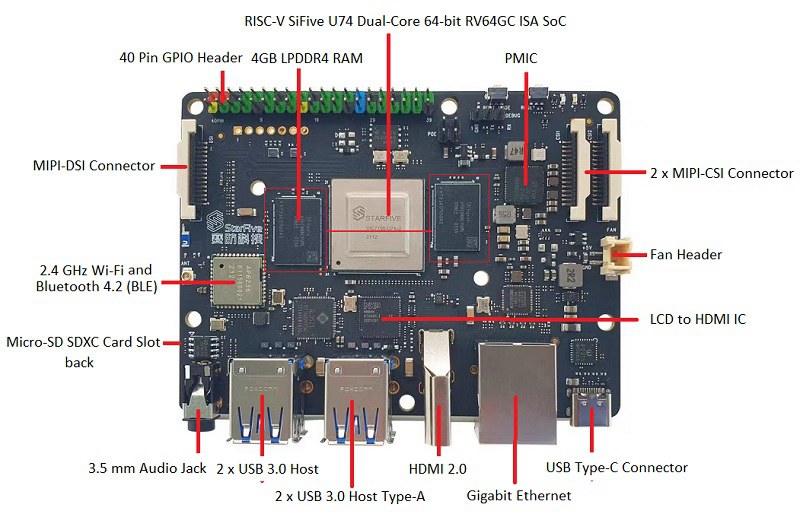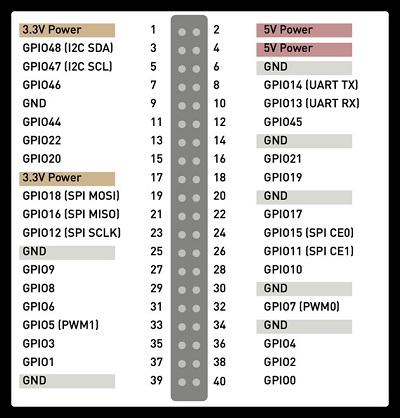Difference between revisions of "StarFive VisionFive JH7100 RISC-V Single Board Computer"
(→Pinout Diagram) |
(→40 Pinout Diagram) |
||
| Line 76: | Line 76: | ||
==40 Pinout Diagram== | ==40 Pinout Diagram== | ||
[[File:VisionFive_risc-v_sbc_gpio.jpg]] | [[File:VisionFive_risc-v_sbc_gpio.jpg]] | ||
| + | |||
| + | Notes: | ||
| + | *Each GPIO pin can safely draw a maximum current of 39 mA, whereas the maximum current draw when all GPIOs are combined should be less than 100 mA. Please take this into account or otherwise you will end up destroying the GPIO pins. | ||
| + | *All GPIOs can be configured to support different functions including but not limited to SDIO, Audio, SPI, I2C, UART and PWM. | ||
Revision as of 18:29, 4 March 2022
Contents
Introduction
StarFive VisionFive JH7100 is world‘s first generation of affordable RISC-V boards designed to run Linux. Based on RISC-V architecture, VisionFive pushes open-source to the next level and gives developers more freedom and power to innovate and design industry-leading solutions. This is not an official development board for the Banana Pi community, but the Banana Pi open Source community and StarFive work closely together to advance risC-V open source hardware.
VisionFive is the first generation of affordable RISC-V computers designed to run Linux. It is fully open-source with open-source software, open hardware design and RISC-V open architecture.It is powered by RISC-V SiFive U74 Dual-Core 64-bit RV64GC ISA SoC with 4GB/8GB LPDDR4 RAM variants and has rich I/O peripherals such as USB 3.0 ports, 40-pin GPIO header, Gigabit Ethernet Connector, Micro-SD card slot and much more.VisionFive also has rich AI features with Neural Network Engine and NVDLA Engine. It has onboard audio and video processing capabilities and has MIPI-CSI and MIPI-DSI connectors for video hardware. It has wireless capabilities with Wi-Fi and Bluetooth (BLE) and has a wide software compatibility including support for Fedora.
Features
- Truly open-source hardware, software and RISC-V open architecture
- Powerful and rich AI features with Neural Network Engine and NVDLA Engine
- Abundant I/O peripherals
- Wireless connectivity with Wi-Fi and BLE
- Onboard video and audio processing
- Wide software compatibility including support for Fedora linux
Hardware
Hardware interface
Hardware spec
| Specificationc | Details |
| Processor | -RISC-V SiFive U74 Dual-Core 64-bit RV64GC ISA SoC with 2MB L2 cache @ 1.0GHz |
| -Vision DSP Tensilica-VP6 for computing vision @ 600MHz | |
| -NVDLA Engine (configuration 2048 MACs @ 800MHz) | |
| -Neural Network Engine (1024MACs @ 500MHz) | |
| Memory | 8GB LPDDR4 |
| Wireless Connectivity | -2.4 GHz Wi-Fi (IEEE 802.11b/g/n),-Bluetooth 4.2 (BLE) |
| Video Processing | -2 x MIPI-CSI (up to 4K@30fps), 1 x MIPI-DSI (up to 4K@30fps) |
| -1 x HDMI 1.4 (up to 1080p@60fps display) | |
| -Video Decoder (H264/H265) up to 4K@60fps; Support Dual stream decoding for 2K@30fps each | |
| -Dual channels of ISP, each channel support up to 4K@30FPS | |
| -Support MIPI-CSI TX for video output after ISP and AI processing | |
| -JPEG encoder/decoder | |
| Dedicated Audio Processing | -Ultra-low power Voice Activity Detector for audio bit-stream as a Voice Trigger |
| DSP and Sub-system | -On-chip Audio DAC |
| -Support DMIC and AMIC, up to 4 channels | |
| Peripherals | -4 x USB 3.0 ports |
| -40 Pin GPIO Header (28 x GPIO, I2C, I2S, SPI, UART) | |
| -Gigabit Ethernet Connector | |
| -3.5 mm Audio jack (4-pole stereo audio output) | |
| -Micro-SD card slot for system boot and data storage | |
| -Support TRNG and OTP | |
| -Support DMAC, QSPI and other peripheral | |
| -Reset button and Power Button | |
| Power Supply | -Minimum: 5 V / 1.5 A,-Recommended: 5 V / 3 A |
| Power Connector | -USB Type-C port or 40-pin GPIO header |
| Dimensions | 100 mm x 72 mm |
40 Pinout Diagram
Notes:
- Each GPIO pin can safely draw a maximum current of 39 mA, whereas the maximum current draw when all GPIOs are combined should be less than 100 mA. Please take this into account or otherwise you will end up destroying the GPIO pins.
- All GPIOs can be configured to support different functions including but not limited to SDIO, Audio, SPI, I2C, UART and PWM.

